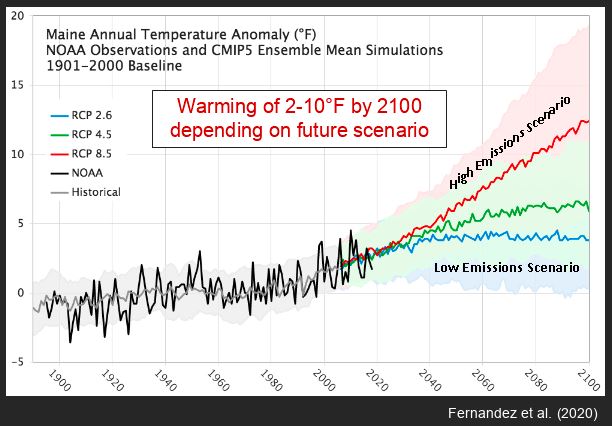Yesterday at the Augusta Civic Center, my working group reported to the Climate Council on the current effects of climate change in Maine in these areas:
- Climate and terrestrial ecosystems
- Marine systems and sea level rise
- Forested lands
- Agriculture and food systems
- Human health
- Economic activity
I was privileged to work with a great group of dedicated scientists and economists on this initial baseline report which will be published in full next week.
- Presentation by the Scientific and Technical Subcommittee to the Maine Climate Council
As we transition to cleaner fuels and efficiency, Maine’s prosperity no longer is directly linked to consumption of carbon fuels.
We are also on track to meet ambitious goals for emissions reductions, although much work remains ahead in relation to transportation, efficiency, and building capacity for carbon sequestration
- Maine on target to meet near-term greenhouse gas emissions goals, Press Herald, 1/29/2020
Also, Ania Wright, my friend, colleague, and youth climate leader , briefed the Climate Council on her perspective from the UN Climate conference in Madrid in December and the connection between the international effort and Maine’s. You can see her remarks here.
Summary of in-state terrestrial climate change effects:
- Maine’s statewide annual temperature 3°F warmer since 1895.
- Models project additional warming of 2-10°F by 2100 depending on future scenario.
- Warm season lengthened ~2 weeks since 1950, mostly into fall.
- Annual precipitation increased ~6” since 1895, largest increase over the last 20 years.
- Drought has not increased in frequency, but rising temps could exacerbate droughts that emerge.
- Extreme weather has become more common across the Northern Hemisphere over recent decades.
- More frequent heavy precipitation, more intense storms, and greater tendency for heat/cold waves to develop.
- Trend toward earlier snowmelt and runoff by 1-2 weeks since ca. 1950.
- Magnitude & frequency of small floods increasing.
- 100-yr, 3-day peak streamflows projected to decrease, likely due to late winter snowpack.

